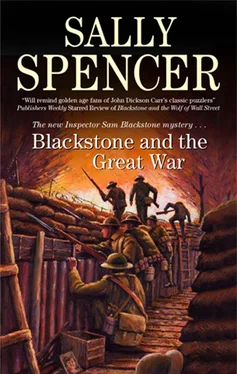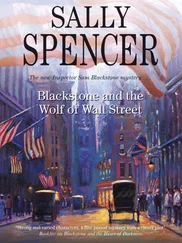Sally Spencer - Blackstone and the Great War
Здесь есть возможность читать онлайн «Sally Spencer - Blackstone and the Great War» весь текст электронной книги совершенно бесплатно (целиком полную версию без сокращений). В некоторых случаях можно слушать аудио, скачать через торрент в формате fb2 и присутствует краткое содержание. Жанр: Исторический детектив, на английском языке. Описание произведения, (предисловие) а так же отзывы посетителей доступны на портале библиотеки ЛибКат.
- Название:Blackstone and the Great War
- Автор:
- Жанр:
- Год:неизвестен
- ISBN:нет данных
- Рейтинг книги:4 / 5. Голосов: 1
-
Избранное:Добавить в избранное
- Отзывы:
-
Ваша оценка:
- 80
- 1
- 2
- 3
- 4
- 5
Blackstone and the Great War: краткое содержание, описание и аннотация
Предлагаем к чтению аннотацию, описание, краткое содержание или предисловие (зависит от того, что написал сам автор книги «Blackstone and the Great War»). Если вы не нашли необходимую информацию о книге — напишите в комментариях, мы постараемся отыскать её.
Blackstone and the Great War — читать онлайн бесплатно полную книгу (весь текст) целиком
Ниже представлен текст книги, разбитый по страницам. Система сохранения места последней прочитанной страницы, позволяет с удобством читать онлайн бесплатно книгу «Blackstone and the Great War», без необходимости каждый раз заново искать на чём Вы остановились. Поставьте закладку, и сможете в любой момент перейти на страницу, на которой закончили чтение.
Интервал:
Закладка:
‘I’d like to see Lieutenant Fortesque’s body.’
‘That’s not possible,’ Carstairs said.
And then he laughed, as if he’d realized he’d just scored a small triumph, which did, at least, do something to mitigate his larger defeat.
‘Why isn’t it possible?’ Blackstone asked. ‘Give me a couple of men with spades, and I’ll-’
‘Do you think that he was buried here in France, like a common soldier?’ Carstairs said scornfully.
‘Wasn’t he?’
‘He most certainly was not. The lieutenant’s body has been shipped back to England, where, with all due and appropriate ceremony, he will be laid to rest with his ancestors, in the family vault.’
Of course he would, Blackstone thought, because even in death there was one law for the rich and another for the poor.
FIVE
The village of St Denis was perched at the apex of a small hill, some four miles behind the British lines. An old stone church stood at its centre — its spire straining upwards, as if it wished to pierce the sky — and the houses and shops were clustered around it. Seen from a distance, across the sunny summer meadows, it was as pretty a village as any which had ever graced a picture postcard.
It must have been a quiet, peaceful place a few years earlier, Blackstone thought — a sleepy hamlet which fully accepted that there was a whole wide world beyond its own narrow boundaries, but had no real interest in knowing any more about that world than was strictly necessary. But those days were gone forever. The simple innocence, in which the village had once been snugly packed, had been roughly ripped from it by the great iron fist of war — and the place would never be the same again.
He was less than half a mile from the village when he first noticed the rows of low grey tents pitched in a field at the foot of the hill. As he drew closer, he could see the soldiers, too. Some were being endlessly paraded up and down, in full battledress. Others, under the screamed encouragement of their NCOs, were charging sacks of sand, and stabbing them with their bayonets.
So even here, there was no respite from the war, Blackstone thought. Even here, where the weary and disillusioned men should have been able to snatch a little rest, they were being put through pointless drills which would be of no use to them at all, once they came under the deadly scything action of hot machine-gun fire.
Shaking his head, Blackstone slowly walked up the steep cobbled street which led to the church. The houses he passed were all half-timbered, and several of their lower floors had been converted into quaint business premises — a bakery, a butcher’s, a pharmacy, a doctor’s surgery, and a modest cafe — though all of them were now empty.
Several of the houses had all but been destroyed by shells fired in earlier battles, and even those that remained standing were pockmarked with bullet holes. And there were no civilians to be seen — no pretty girls, no gnarled peasants, no crafty shopkeepers — just men in khaki uniforms who wandered aimlessly, finally free of their pointless duties for a while, but with no avenues open to them to really enjoy that freedom.
At the top of the street he reached a square, with the church on one side of it, and the mairie — which was now flying the Union Flag instead of the Tricolour — directly opposite.
But it was not the mairie — nor the church — which immediately captured his attention. Instead, his gaze was drawn to the two-wheeled cart at the centre of the square — next to the village fountain — and to the soldier who seemed to have almost become a part of it.
The cart, known in military parlance as a limber, had been designed for moving heavy artillery, and so its wheels were over six feet high. And it was against one of these wheels that the man had been spreadeagled, his wrists tied to two of the upper spokes, his ankles to two of the lower ones.
‘Drunk and disorderly?’ Blackstone asked, as he approached the man.
‘That’s right,’ the soldier agreed, and he grinned sheepishly, though he was obviously in some discomfort. ‘Still, there’s worse things than Field Punishment Number One, ain’t there? Hanging here’s not so bad, once you get used to it — and they could have made the case for having me shot, if they’d been of a mind to — so I’ve no complaints. And they’ll be cutting me down in a few hours.’
‘And tying you up again tomorrow morning,’ Blackstone said.
‘That’s the way it goes,’ the soldier said philosophically, and if he’d had sufficient freedom of movement to shrug, he would probably have done just that. ‘Twenty-eight days, they gave me. I did three days before we went down to the front line, and I’ve done another six since we got back here. So, if they don’t send us into the trenches again, I’ve got another — ’ he did a quick calculation — ‘another nineteen to do. Course, if they do send us back — and I get killed — the army will just have to whistle for the rest of the punishment.’
There was a part of Blackstone that admired the man for his spirit of endurance, and part of him that was furious at the soldier’s casual acceptance of the brutality meted out to him. But there was no point in expressing either of these emotions — because this was not his army or his war.
‘Can I get you anything?’ he asked.
The soldier grinned again. ‘A pint of best London bitter would be much appreciated,’ he said, ‘but I’ll settle for a drink of water from the fountain.’
‘Get away from that man!’ screamed a voice behind them, and turning around, Blackstone saw a redcap corporal standing in the doorway of the mairie .
Blackstone laid his carpet bag on the ground, walked across to the fountain, scooped up some water in his cupped hands, and returned to the man on the wheel.
‘Didn’t you hear me?’ the redcap bawled as he strode furiously across the square. ‘I told you to get away from that man!’
Blackstone held his hands up, and the man on the wheel drank greedily.
The redcap had drawn level with them now.
‘Can’t you understand the King’s English, you ignorant bloody Frog?’ he demanded. ‘You shouldn’t even be here in this village — let alone be making contact with the prisoner!’
He gave Blackstone a rough push, and seemed surprised when the other man held his ground.
‘Now listen,’ he continued, raising his fist threateningly, ‘if you don’t do what I say, you could get hurt.’
Blackstone balled up his own fists.
‘Touch me again, and I’ll break your nose,’ he promised.
Perhaps it was his tone of calm confidence that caused the redcap to lower his arm, or perhaps it was simply the fact that he realized he was dealing with a fellow countryman.
‘You’re English!’ he said.
‘You’re as sharp as a needle aren’t you?’ Blackstone asked.
The redcap frowned. ‘You’re not that copper from New Scotland Yard, are you?’ he asked, incredulously.
‘Yes.’
‘I expected somebody a bit smarter-looking.’
‘If you were expecting me, I assume that makes you the welcoming committee,’ Blackstone said.
The redcap’s frown deepened. ‘I’m Corporal Johnson, the bloke what’s been ordered to show you your billet, but you ain’t welcome in any shape or form,’ he said. ‘The MFP are the law out here on the Western Front, an’ we don’t like no civilian coming in and telling us how to do our job.’
Blackstone ran his eyes quickly up and down the other man. Johnson was around twenty-three or twenty-four, he guessed. He was of average height and had the sort of face which would not stand out in even a small crowd. His eyes suggested steadiness, but no great intelligence. He was someone you could put in charge of any routine task with confidence — but if you were expecting any leaps of imagination from him, you were almost bound to be disappointed.
Читать дальшеИнтервал:
Закладка:
Похожие книги на «Blackstone and the Great War»
Представляем Вашему вниманию похожие книги на «Blackstone and the Great War» списком для выбора. Мы отобрали схожую по названию и смыслу литературу в надежде предоставить читателям больше вариантов отыскать новые, интересные, ещё непрочитанные произведения.
Обсуждение, отзывы о книге «Blackstone and the Great War» и просто собственные мнения читателей. Оставьте ваши комментарии, напишите, что Вы думаете о произведении, его смысле или главных героях. Укажите что конкретно понравилось, а что нет, и почему Вы так считаете.












